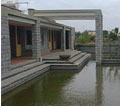Guiding Principles (Dublin Principles)
Concerted action is needed to reverse the present trends of overconsumption, pollution, and rising threats from drought and floods. The Conference Report sets out recommendations for action at local, national and international levels, based on four guiding principles.
Principle No. 1
Fresh water is a finite and vulnerable resource, essential to sustain life, development and the environment Since water sustains life, effective management of water resources demands a holistic approach, linking social and economic development with protection of natural ecosystems. Effective management links land and water uses across the whole of a catchment area or groundwater aquifer.
Principle No. 2
Water development and management should be based on a participatory approach, involving users, planners and policy-makers at all levels.
The participatory approach involves raising awareness of the importance of water among policy-makers and the general public. It means that decisions are taken at the lowest appropriate level, with full public consultation and involvement of users in the planning and implementation of water projects.
Principle No. 3
Women play a central part in the provision, management and safeguarding of water.
This pivotal role of women as providers and users of water and guardians of the living environment has seldom been reflected in institutional arrangements for the development and management of water resources. Acceptance and implementation of this principle requires positive policies to address women■s specific needs and to equip and empower women to participate at all levels in water resources programmes, including decision-making and implementation, in ways defined by them.
Principle No. 4
Water has an economic value in all its competing uses and should be recognized as an economic good. Within this principle, it is vital to recognize first the basic right of all human beings to have access to clean water and sanitation at an affordable price. Past failure to recognize the economic value of water has led to wasteful and environmentally damaging uses of the resource. Managing water as an economic good is an important way of achieving efficient and equitable use, and of encouraging conservation and protection of water resources.


